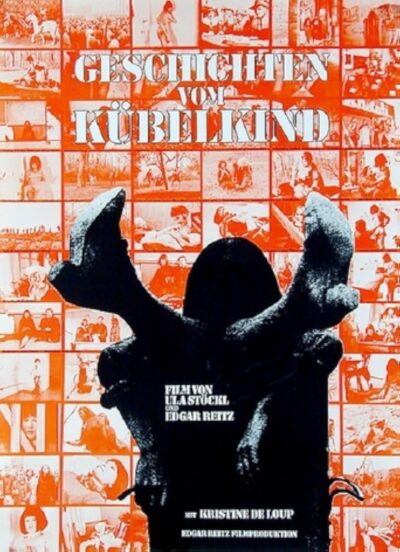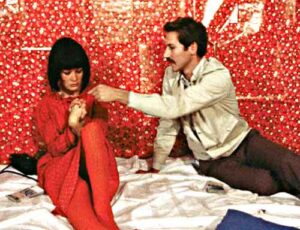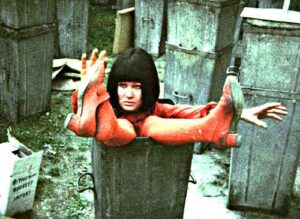The most ambitious product of the New German Cinema was this bawdy 1971 epic, made by that no-longer-new movement’s founder Edgar Reitz in collaboration with Ula Stöckl. TALES OF THE DUMPSTER KID (Geschichten vom Kübelkind) took the form of 25 self-contained episodes (more were planned but never shot), each with its own cheeky title (“Dumpster Kid Gets Slick and Round,” “Dumpster Kid Learns a Fucked-Up Game,” etc.). Some of those episodes are plot-heavy and elaborate, others short and meaningless (as in one consisting of the title character walking bottomless through a field of tall grass), while in others the characters unexpectedly break into song.
In its Initial version the film ran three and half hours, with the episodes grouped sequentially. In later years TALES OF THE DUMPSTER KID took the form of 25 separate shorts and a feature missing an hour’s worth of episodes, with the remaining ones presented out of order. Given that the material works best as a whole, I feel the initial version is the preferable one.
The film’s cheeky irreverence and feminist leanings are outlined in episode #1. In it the title character (future Rainer Werner Fassbinder regular Kristine de Loup), a young brunette sporting a Louise Brooks ‘do and red peasant dress (on those rare occasions when she’s not naked), is seen challenging several men to a pants-less dash. She wins, proving that “A woman with her skirt up runs quicker than a man with his pants down.”
From there we flash back to Dumpster Kid’s birth in a trash can, into which a nurse has just dumped a mass of afterbirth. From this slimy morass Dumpster Kid emerges fully grown. Mrs. Dr. Welfare (Heidewig Fankhänel), a social worker, runs into Dumpster Kid, who’s given the name Therese Kalwa, enrolled in a school with several down syndrome afflicted children and sent, unwillingly, to live in various foster homes.
In so doing Therese is sexually abused by at least one foster parent, seduces the son of another, gets branded with a flower symbol on her right shoulder, is made a circus attraction by sleazy carnival owners and meets a lovesick man who cuts off parts of his body and feeds them to her as a signifier of his affection. Therese concludes that particular episode by dying, and not for the first (or last) time.
Further exploits include shacking up with a Bluebeard-like nobleman (Jacques Freers) who tries to hang her, getting chased down by a hostile mob who try to burn her as a witch, marrying a young man (Peter Hohberger) but ending up dead when she answers “No” instead of “I do” at the wedding ceremony, and teaching a class whose prime directive, written on the chalkboard, is “ALL POWER TO VAMPIRES”—and gets turned into a blue-faced bloodsucker. Famous folk she meets include Al Capone (Hans Sukopp), who she tries to inspire (unsuccessfully) to join a revolution, and the three musketeers, whose lives she complicates severely. She also becomes a prostitute, and gets strangled to death by a creepy john (New German Cinema legend Werner Herzog), leading to the bemused observation that “Once you’re dead, life’s a blast!”
Featured are a couple impressive tracking shots and some imaginative visual design, but bravura filmmaking isn’t this low budget film’s major draw. The John Waters-esque trash movie aesthetic, which revels in overtly tacky set design and period scenes that make no effort at hiding the modern-day anachronisms, no longer seems as revolutionary as it once did, and there are portions that fall flat (the plodding Al Capone episode, presented in black and white meant to recall the film noirs of old, doesn’t work at all). We also get several instances of Kristine de Loup performing in urban settings, amid actual crowds whose members stare curiously and unashamedly into the camera.
What renders TALES OF THE DUMPSTER KID memorable is its audacious genre hopping (this is a rare example of a satiric-horrific-pornographic family drama-film noir-musical-period piece) and exuberantly uninhibited, freewheeling tone. Whatever else this film may be, it’s certainly fun.
Vital Statistics
TALES OF THE DUMPSTER KID (Geschichten vom Kübelkind)
Edgar Reitz Film
Directors: Edgar Reitz, Ula Stöckl
Producer: Edgar Reitz
Screenplay: Edgar Reitz, Ula Stöckl
Cinematography: Kenan Ormanlar, Edgar Reitz
Editing: Jessy von Sternberg
Cast: Kristine de Loup, Hans Sukopp, Jacques Freers, Peter Hohberger, Bruno Bendel, Alf Brustellin, Ilse Brustellin, Hans Heinrich Brustellin, Antje Ellermann, Heidewig Fankhänel, Peter Finkenstaedt, Josette Genet-Bollinger, Albert Guilhamot, Karl Hauer, Erika Heffner, Werner Herzog, Peter Hohberger, Alexander Kaempfe, Ekkehart Kühn, Maximiliane Mainka, Rainer Ostendorf, Reiner Prier, Christian Reitz, Hannelore Ulfers, Heike Ulfers, Wolfgang von Ungern-Sternberg





